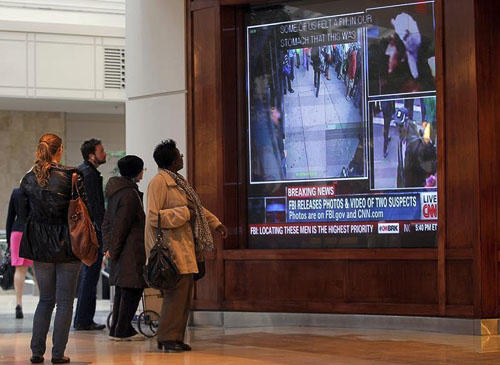The Boston bombings marred the landscape of our country with terror yet again, and as we move further away from April 15 we are left with a lingering awareness of the evil that lives in people—and, at the same time, the overwhelming good in others. Pictures and stories of true heroes will remain with us.
Boston bombing reporting an embarrassment

The Boston bombings marred the landscape of our country with terror yet again, and as we move further away from April 15 we are left with a lingering awareness of the evil that lives in people—and, at the same time, the overwhelming good in others. Pictures and stories of true heroes will remain with us.
What were horrifying days for many citizens of Boston, however, were embarrassing ones for our media. As so many of us were attached to our TVs, computers or smartphones for the latest news of the attack, we were treated to some of the worst reporting in a long time. The problem: We had no idea what the truth was because almost every news organization was getting it wrong.
Minute by minute, “facts” were being churned out that not long afterwards were discovered to be fiction. From reports of five more undetonated bombs to a third bombing at the JFK Library to cell phone service being shut down in the Boston area to prevent any “remote explosive detonations,” we were hit with a barrage of “news” that did nothing more than reveal the media’s anxiety to break any story as quickly as humanly possible.
One of the most revealing pieces of misreporting was by CNN, who reported that an arrest had been made and that the suspect was a “dark-skinned male.” Of course, they had to retract this quickly when it was discovered that the suspect was in fact still at large and his skin was very much that of a Caucasian. But I’m sure it all sounded very plausible, so why not?
Then (perhaps going off the “dark-skinned” tip) it was reported that the second suspect had been identified as Sunil Tripathi, a student at Brown University. The heartbreaking truth was that Tripathi had indeed been missing for weeks, and his body was later pulled from a river. He was in no way a participant in the bombings. Just another innocent case of mistaken identity, right? It’s unconscionable that his parents, no doubt already sick with worry, were tortured further as their missing son’s name was linked to these acts of terror.
The networks, tucking their tails between their legs, apologized profusely and endured the embarrassment of their mistakes for a few days, and then everything went back to normal—which is the problem. It’s a problem when normal is “you heard it here first,” not “you heard it here correctly.”
With our increasing hunger for instant news and up-to-the-minute reporting, journalism is now more about breaking the story than thoroughly investigating it, more about splashing incredible headlines than threshing out the facts.
Americans are OK with it, too.
We’d probably be lying if we said that all the misinformation wasn’t just a little reassuring—it gave us something to hold onto, something to “know,” when, really, there was nothing to know. We don’t like being in the dark and the news media know this; it feeds their bottom line and they’re more than happy to oblige. Oh well, so they get a few things wrong along the way.
As much as I love living in a time when I can find out almost anything with the click of a button, I often wonder if our brains don’t wish we’d slow down for a minute and stop forcing them to process an overabundance of noise. To just take a minute, to wait. I know, what an archaic word.
But as networks furiously pit their shows against each other and cutthroat deals are made in dark corners and anchors are fired for not “connecting” with us enough, what we see is definitely what we get—and it isn’t pretty. How can we hold them to a higher standard if we’re gulping up what they give us in one swallow?
I, for one, wouldn’t have minded waiting for reporters to get their facts straight if it meant that a mother would be saved even a minute of wondering the unthinkable: if her beloved son was a terrorist. No one should have to go through that, and it’s a shame that we will all too quickly forget it even happened.






